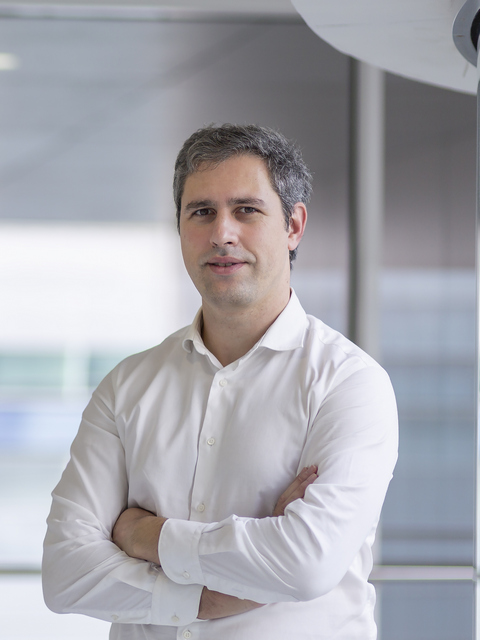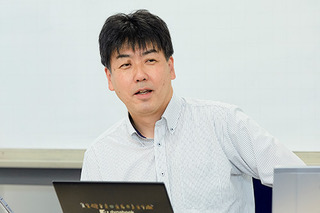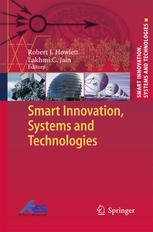Keynote Speakers
We are very pleased to have acquired the services of an excellent selection of keynote speakers for the symposium The speakers and the titles of their talks are shown below.
Dr. Iván Macía
Director of the Department of Digital Health and Biomedical Technologies, Vicomtech, SpainMulti-modal data analysis and AI enabling personalized and precision medicine
More details ...
Prof. Hiroshi Takahashi
Graduate School of Business Administration, Keio University, JapanFinancial and business economic research through artificial intelligence
More details ...
Assoc. Prof. Dr. Roman Sperka, PhD
Silesian University, School of Business Administration in Karvina, Czech RepublicProcess mining applications
More details ...
Prof Ivan Luković
University of Belgrade, SerbiaNew Education Perspectives - How to Profile Experts for a Digital Economy Era
More details ...
Dr. Iván Macía
Director of the Department of Digital Health and Biomedical Technologies, Vicomtech, SpainMulti-modal data analysis and AI enabling personalized and precision medicine
Abstract:
In the context of an increased pressure of health systems, personalized and precision medicine have the promise to deliver better prevention and intervention strategies targeted to individuals. Approaches have evolved from a personalization based on clinical variables and individual preferences to precision diagnostics and targeted therapies based on the analysis of individual genes or phenotypic traits. At the same time, there is a revolution in digital diagnostic technologies, improving existing techniques, e.g. medical imaging or genomics, or novel techniques providing deeper insights for better disease diagnosis and prognosis. The amount of information generated is huge and ever growing, however, much of it is barely exploited. Novel artificial intelligence technologies, with emphasis on deep learning, are capable of processing and integrating such vast amounts of multi-modality information, either obtained in research studies or from clinical practice, promising a great impact in novel approaches to disease prevention, diagnosis, prognosis and intervention. In this talk, and overview and examples of different approaches and their advantages will be provided in several areas of disease and clinical processes.

Biography:
Dr Macía holds an Industrial Engineering degree (2002) and an Industrial Automation and Electronics Engineering degree (2003) from the University of Navarra (Spain), and a PhD in Computer Science and Artificial Intelligence from the University of the Basque Country UPV-EHU (2012) with a Doctoral thesis in the field of Medical Image Analysis with Artificial Intelligence, where he specialized in vascular image analysis.
He has developed most of his research career in Vicomtech applied research centre (San Sebastian, Spain) where he started in 2003 working in digital technologies for the health domain. Since 2014, he holds the position of Director of the Digital Health and Biomedical Technologies Department, leading a group of 35 researchers in 5 research areas: Digital Health, Predictive and Precision Medicine, Digital Biomedical Devices, Image Analysis and Deep Learning and Big Data for Healthcare. At present time the Department takes part in 7 EU funded projects by H2020 and Horizon Europe.
He also leads the Digital Health research group at the Biogipuzkoa Health Research Institute, a multidisciplinary group of clinicians and engineers, and is part of the UPV-EHU Computational Intelligence Group.
He has 20 years of experience in R&I in the development of computer-aided diagnostic systems, Data Analytics and Artificial Intelligence in the biomedical sector, and responsible for several medical image analysis products on the market, and received the European Quality Innovation of the Year Award (2015) in Social and Healthcare Sector by the Finnish Quality Association. He has been responsible for multiple R&I projects and in collaboration with companies, technology centres, academia, health and scientific institutions, as well as responsible for the development of various software libraries and solutions currently in use as assets of Vicomtech. He is also the author of more than 50 publications in impact journals and congresses in the mentioned areas.
He acted as general Project Coordinator of DESIREE Project Decision Support and Information Management System for Breast Cancer-, funded by H2020 (Grant Agreement nº 690238). At present time he is Principal Investigator from Vicomtech in the LUCIA Project - Understanding Lung Cancer related risk factors and their Impact- funded by Horizon Europe in the Mission Cancer (Grant Agreement nº 101096473) where he leads the definition of the LUCIA software ecosystem, data analytics and application development and the Risk factors AI modelling activities.
Prof. Hiroshi Takahashi
Graduate School of Business Administration, Keio University, JapanFinancial and business economic research through artificial intelligence
Abstract:
The progress of artificial intelligence technology has attracted broad attention across different sectors, including business and academia, prompting discussions on the application of information technology from various viewpoints, covering society, organizations, and individuals. Finance is also among these fields. In finance, several initiatives are in progress in various areas, such as corporate finance, which emphasizes aspects like corporate investments and governance, asset pricing, focusing on the development of asset prices, and asset management. This talk will offer an outline of several analyses and case studies, primarily in the domains of financial and business economics.

Biography:
Professor of Finance, Graduate School of Business Administration, Keio University / Keio Business School, Japan. Hiroshi TAKAHASHI received his BA in 1994 from Department of Applied Physics, School of Engineering, the University of Tokyo, Japan. He received his M.S. degree and Ph.D. degree from University of Tsukuba, Japan. He was a researcher at Fuji Film co., ltd., a senior researcher at Sumitomo Mitsui Trust Bank (former the Mitsui Trust and Banking co., ltd.), an associate professor at Okayama University, and an associate professor at Keio University from 2008 to 2014. He was a visiting researcher at Kiel University, Germany in 2007. He has been a professor at Graduate School of Business Administration, Keio University, Japan since 2014. He has served as the chairperson of the Coordination Council for Industry-Government-Academia Consultations on the Promotion of Utilization of Big Data, etc., Ministry of Internal Affairs and Communications (MIC), a member of the editorial board of the Securities Analysts Journal, and Director of the Journal of the Japan Society for Management Information Science. His research interests include Finance, Computer Science, and Management Science.
Assoc. Prof. Dr. Roman Sperka, PhD
Silesian University, School of Business Administration in Karvina, Czech RepublicProcess mining applications
Abstract:
Process mining stands as a powerful analytical approach deeply rooted in the scrutiny of business data. It involves a meticulous analysis of event logs generated during the execution of business processes to unravel crucial insights into process dynamics, operational efficiency, and adherence to compliance standards. By tapping into the extensive information embedded in these event logs, process mining paints a detailed and objective picture of how business processes unfold within an organization. The methodology encompasses diverse techniques, including process discovery, conformance checking, and performance analysis, aiming to unveil concealed patterns, deviations, and bottlenecks in business operations. Organizations can leverage process mining to optimize workflows, enhance operational efficiency, and ensure compliance with regulations, making it an invaluable tool in sectors such as supply chain management, finance, healthcare, and information technology. Whether identifying inefficiencies in procurement processes or improving patient care pathways, the focus on business data empowers organizations to make informed decisions, fostering transparency, efficiency, and agility in their business processes. The keynote presentation will explore the process mining basic applications.

Biography
Assoc. Prof. Dr. Roman Sperka, PhD is a Head of the Business Economics and Management Department at Silesian University, School of Business Administration in Karvina, Czech Republic and a Dean of the School since 2023. He has participated in several EU and institutional projects. He was a Management Committee member od a COST EU action, CA18115 "Transnational Collaboration on Bullying, Migration and Integration at School Level", 2020 - 2023. He is a Programme Co-Chair of the KES-AMSTA conference and Executive Co-Chair of a DEMSME conference. His primary interests are business process management, agent-based models and simulation in socio-economic systems, process mining and business economics. He has been an author or co-author of more than 100 publications since 2011 (2 books/monographs, 4 journal papers with impact factor, 14 Scopus journal papers, 28 Web of Science conference proceedings papers, and over 450 citations).
Prof Ivan Luković
University of Belgrade, SerbiaNew Education Perspectives - How to Profile Experts for a Digital Economy Era
Abstract:
Nowadays, modern business includes acquisition and storing enormous data volumes, larger than ever before. Such data represent a significant value that an organization or a society can utilize to reach created goals and provide sustainable development. Unfortunately, a daily practice still intensively points out to the problem of a serious gap between the identified needs for knowledge, on one hand, and inability of the disciplines of Computer Science, Software Engineering, and Artificial Intelligence (CS & SE & AI, for short), combined with the modern software technologies, to address such needs in an effective way, on the other hand. One of the important causes of such phenomenon is in a lack of strongly educated and interdisciplinary oriented experts showing an appropriate level of knowledge both in CS & SE & AI, as well as in the disciplines of Management and Economics, for a specific problem domain. In this presentation, we will address issues on how to come to more flexible and interdisciplinary oriented study models capable of producing various forms of digital managers, as a new profile of experts, ready to cope with digital economy and digital transformation in a modern society. Massive deployment of such experts is a way to significantly raise the level of organization maturity regarding capabilities for: information management, quality management, business processes, and big data analytics.

Biography
Ivan Luković received his diploma degree (5 years) in Informatics from the Faculty of Military and Technical Sciences in Zagreb in 1990. He completed his M.Sc. (former Mr, 2 years) degree at the University of Belgrade, School of Electrical Engineering in 1993, and his Ph.D. at the University of Novi Sad, Faculty of Technical Sciences in 1996. Currently, he works as a Full Professor at the Faculty of Organizational Sciences of the University of Belgrade, where he lectures in several Computer Science and Informatics courses. His research interests are related to Database Systems, Information Systems, Business Intelligence, Software Engineering, and Data Science. He is the author or co-author of over 200 papers, 4 books, and 30 industry projects and software solutions in the area. He supervised 13 completed Ph.D. theses. He created a new set of B.Sc. and M.Sc. study programs in Information Engineering, i.e. Data Science, at the Faculty of Technical Sciences. The programs were accredited for the first time in 2015. Currently, he is a chair of Managing Board of the Computer Science and Information Systems (ComSIS) journal, and a chair of M.Sc. study program in Information Engineering at Faculty of Organizational Sciences. He is also a member of Serbian AI Society.



